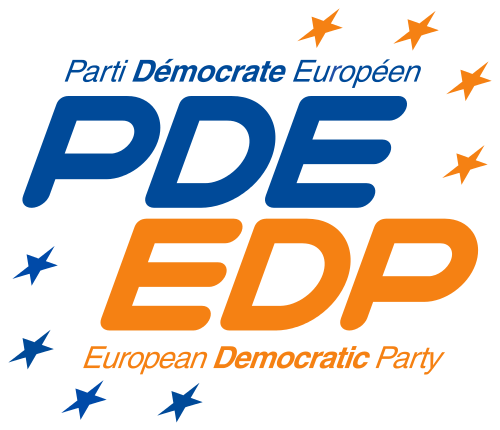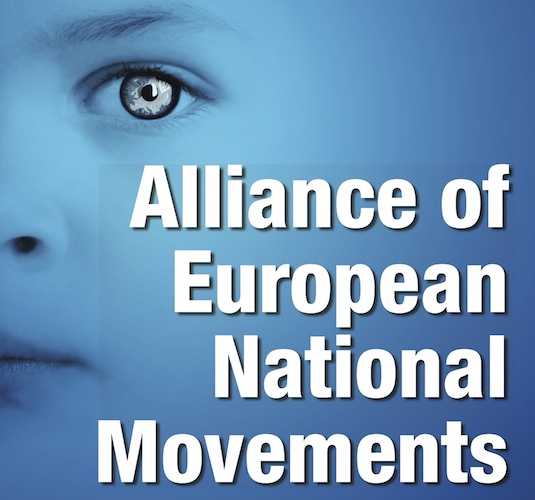
漢德百科全書 | 汉德百科全书
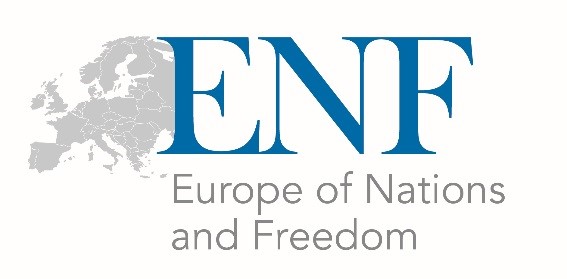
Europa der Nationen und der Freiheit (ENF; englisch Europe of Nations and Freedom, ENF; französisch Europe des nations et des libertés, ENL) ist eine Fraktion im Europäischen Parlament,[1][2][3] deren Mitglieder von rechtspopulistisch bis rechtsextrem charakterisiert werden.[4][1] Mit 36 Mitgliedern ist sie die kleinste Fraktion des Parlaments. Gemeinsame Fraktionsvorsitzende sind Marcel de Graaff von der niederländischen Partij voor de Vrijheid (PVV) und, seit 12. September 2017, Nicolas Bay von der französischen Rassemblement National (RN). Vorgänger von Bay war, bis zu ihrem Wechsel ins französische Parlament im Juni 2017, die FN-Vorsitzende Marine Le Pen.[1]
Der Rassemblement National, ehemals Front National, stellt den größten Teil der Mitglieder. Die weiteren großen in der Fraktion vertretenen Parteien sind die Freiheitliche Partei Österreichs (FPÖ), die italienische Lega und die niederländische Partij voor de Vrijheid. Aus Deutschland ist Marcus Pretzell (Die blaue Partei, früher Alternative für Deutschland) in der Fraktion vertreten. Der Großteil der Fraktionsmitglieder gehört der Europapartei Bewegung für ein Europa der Nationen und der Freiheit an.
Am 8. April 2019 kündigte Matteo Salvini, Vorsitzender der Lega, die Gründung einer Fraktion nach der Europawahl 2019 an, die der ENF nachfolgen soll. Die Fraktion – vorläufiger Name Europäische Allianz der Völker und Nationen – soll neben den bisherigen Mitgliedsparteien unter anderem die Abgeordneten der Alternative für Deutschland, der Dänischen Volkspartei und der Partei Die Finnen aufnehmen.
民族和自由欧洲(英语:Europe of Nations and Freedom)是一个极右翼欧洲议会党团。[12][13][14]
2015年6月15日,该党团有39名议员,是欧洲议会里最小的党团。该党团成员持民族主义、欧洲怀疑主义、右翼民粹主义、反伊斯兰及反移民的观点,但相较于EFDD,比较少反欧盟的色彩。
民族和自由欧洲虽然与同样是右翼民粹主义及欧洲怀疑主义的自由和直接民主欧洲(EFDD)党团的立场相近,但自由和直接民主欧洲主要是偏向于退出欧盟,与以推动反伊斯兰、右翼民粹主义及反移民为主,而非退出欧盟的民族和自由欧洲不同。成员除荷兰自由党外,均支持留在欧盟,部分则对欧盟去留公投持开放态度。
Europe of Nations and Freedom (ENF; French: Europe des nations et des libertés, ENL) is a political group in the European Parliament launched on 15 June 2015. The group is the smallest within the European Parliament at just 37 members. The largest faction in the group is the French National Rally with 17 MEPs. Twenty-eight members are part of the Movement for a Europe of Nations and Freedom (MENF), with the remaining nine MEPs being their ideological allies.
The ENF is the parliamentary group of the Movement for a Europe of Nations and Freedom although PVV's MEPs are members of the European Alliance for Freedom and other MEPs are without any European affiliations.
L'Europe des nations et des libertés est un groupe politique du Parlement européen fondé en juin 2015, situé à droite, voire à l'extrême droite de l'échiquier politique européen. Son parti associé est le Mouvement pour l'Europe des nations et des libertés (MENL).
Europa delle Nazioni e della Libertà (in inglese: Europe of Nations and Freedom Group, ENF; in francese Groupe Europe des nations et des libertés, ENL) è un gruppo politico del Parlamento europeo di destra[3], fondato nel 2015 da alcuni partiti nazionalisti, fortemente euroscettici, precedentemente affiliati all'Alleanza Europea per la Libertà. I partiti che lo compongono chiedono l'uscita di ogni Paese dall'Euro[2] e la revisione dei trattati riguardo l'immigrazione[2].
Europa de las Naciones y de las Libertades (ENF) es un grupo político en el Parlamento Europeo que se lanzó el 15 de junio de 2015. El grupo es el más pequeño dentro del Parlamento Europeo con solo 37 miembros. La facción más grande del grupo es la Agrupación Nacional de Francia con 17 eurodiputados. Veintiocho miembros del ENF forman parte del Movimiento Europa de las Naciones y de las Libertades (MENF), y los 9 diputados restantes son aliados ideológicos.
El ENF es el grupo parlamentario del Movimiento Europa de las Naciones y de las Libertades, aunque los eurodiputados del Partido por la Libertad de los Países Bajos fueron miembros de la Alianza Europea por la Libertad y otros eurodiputados no tienen afiliaciones europeas.
Después de las elecciones europeas de 2019, el grupo estará compuesto por 59 eurodiputados.
Европа наций и свобод (англ. Europe of Nations and Freedom, нем. Europa der Nationen und der Freiheit, фр. Europe des nations et des libertés) — Правая националистическая фракция Европейского парламента, основанная 16 июня 2015 года.
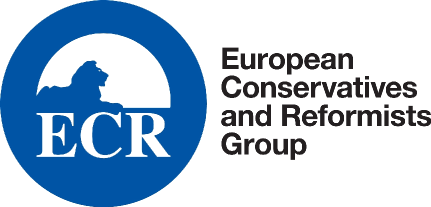
欧洲保守派和改革主义者(英语:European Conservatives and Reformists)是欧洲议会内的一个右翼疑欧保守主义党团,该党团反对欧洲联邦主义,持欧洲怀疑主义,并支持保守主义。党团成员除瑞典的瑞典民主党外,均为该国的主流保守派政党,其党内的成立主要是反对中间偏右保守派欧洲人民党的支持欧洲联邦主义的政策。
现在该党团在欧洲议会拥有73名议员。该党团的主要成员包括英国的保守党、捷克的公民民主党、波兰的法律与公正和瑞典的瑞典民主党。
Die Fraktion der Europäischen Konservativen und Reformer (EKR, bis Ende 2014 Fraktion Europäische Konservative und Reformisten) ist eine 2009 gegründete (national)-konservative und EU-kritische, in Teilen rechtspopulistische Fraktion im Europäischen Parlament. Mit insgesamt 77 Europaabgeordneten aus 16 Ländern ist sie die drittgrößte Fraktion des Parlaments (Stand: 30. Mai 2019[2]). Die beiden größten Parteien in der Fraktion sind die britische Konservative Partei und die polnische Recht und Gerechtigkeit (PiS). Sechs deutsche Abgeordnete gehören der Fraktion an, vier Parteilose sowie je ein Mitglied der Liberal-Konservativen Reformer sowie des Bündnis C.
Die zugeordnete europäische politische Partei ist die Allianz der Konservativen und Reformer in Europa (ACRE). Der Fraktion gehören außerdem Mitglieder der Europäischen Christlichen Politischen Bewegung (ECPM), der Europäischen Freien Allianz (EFA) sowie Abgeordnete ohne Parteizugehörigkeit auf europäischer Ebene an.
欧州保守改革グループ(おうしゅうほしゅかいかくグループ)[1]とは、反連邦主義、保守系の欧州議会の政治会派[2]。会派結成の時点では55名の欧州議会議員が所属しており、議院内において4番目の規模となる[3]。欧州保守改革グループは2009年6月の欧州議会議員選挙を受けて、欧州保守改革同盟が中心となって結成された会派である。
会派内において、とくに大きい政党はイギリスの保守党、チェコの市民民主党 とポーランドの法と正義である。この3党のほかに、ポーランドのポーランドが最も重要、5か国の議員を1人ずつ出している政党、無所属議員2名が参加している。これらの政党の多くは旧欧州人民党・欧州民主主義グループ内のグループであった欧州民主主義グループや諸国民のヨーロッパ連合という、2つの消滅した会派から参加している。
The European Conservatives and Reformists (ECR)[1] is a Eurosceptic,[6][7][8][9][10] anti-federalist[5][6][11] political group in the European Parliament. The ECR is the parliamentary group of the Alliance of Conservatives and Reformists in Europe (ACRE) European political party (formerly known as the Alliance of European Conservatives and Reformists), but also includes MEPs from four other European parties and thirteen MEPs without European party affiliation. The group focuses on reforming the European Union (EU) on the basis of Eurorealism[12] as opposed to total rejection of the EU (anti-EU-ism).[13][14]
The ECR was founded around the Movement for European Reform after the 2009 European elections at the behest of British Conservative Party leader David Cameron. During the Seventh European Parliament (2009–14), the ECR had 55 MEPs, making it the joint fourth-largest group. After the 2014 European elections, the party accepted thirteen new member parties, increasing the group membership to 75 MEPs (by May 2017) and making it the current third-largest group in the European Parliament.
The group is considered centre-right[15] to right-wing.[16] The largest parties in the group by number of MEPs are the Conservative Party of the United Kingdom and Law and Justice (PiS) of Poland.
Le groupe des Conservateurs et réformistes européens (CRE) est un groupe politique européen, regroupant à l'échelle du continent un ensemble de partis de droite et de la droite nationaliste, disposant d'un groupe au Parlement européen et à l'Assemblée parlementaire du Conseil de l'Europe. Fondé en 2009, les CRE comptent vingt-trois partis membres de seize pays différents. Les CRE se décrivent comme « une famille se situant à droite de l'échiquier politique ».
Il Gruppo dei Conservatori e Riformisti Europei (in inglese European Conservatives and Reformists Group; abbr. ECRG o ECR[5]) è un gruppo parlamentare del Parlamento europeo creato il 22 giugno 2009 da partiti conservatori[6] di destra[7][8][9] e di centro-destra[10][11][12] che si dichiarano euroscettici[6][13][14][15] e antifederalisti[6][16], in quanto si oppongono al federalismo europeo. Dal luglio 2014 è il terzo gruppo parlamentare dopo quello del Gruppo del Partito Popolare Europeo e dell'Alleanza Progressista dei Socialisti e dei Democratici.
El Grupo de Conservadores y Reformistas Europeos (GCRE; en inglés European Conservatives and Reformists, ECR) es grupo político del Parlamento Europeo salido de las elecciones europeas de 2009, correspondiente a la legislatura 2009-2014. De ideología conservadora, euroescéptica,2 y antifederalista3 tiene su base en el Movimiento para la Reforma Europea y está afiliado al europartido de la Alianza de Conservadores y Reformistas. En el Parlamento Europeo tiene una representación de 70 miembros, siendo el tercer grupo de la cámara en número de representantes.4
La mayor parte del grupo está integrado por miembros del Partido Conservador del Reino Unido, Ley y Justicia de Polonia, y el Partido Democrático Cívico de la República Checa. Además, también integra a diputados de otros cinco países, como Bélgica, Hungría, Letonia, Lituania y Holanda. La mayoría de los partidos miembros integraron este grupo tras la disolución de los Demócratas Europeos, agrupación integrada en el PPE-DE, y la Unión por la Europa de las Naciones.
Su nivel de euroescepticismo es superior al de los tres grandes grupos parlamentarios europeístas Partido Popular Europeo (Demócrata-Cristianos) y de los Demócratas Europeos (PPE-DE), Alianza Progresista de Socialistas y Demócratas (S&D) y la Alianza de los Demócratas y Liberales por Europa (ALDE), pero inferior al del grupo parlamentario más euroescéptico Europa de la Libertad y la Democracia (ELD).
Европейские консерваторы и реформисты (англ. European Conservatives and Reformists, ECR) — консервативная фракция евроскептиков-конфедератов[2][3] в Европейском парламенте. и Совете местного самоуправления СЕ[4]. Фракция на данный момент состоит из 70 членов парламента, являясь третьей по величине. Создана в 2009 году по результатам европейских выборов членами Движения за европейские реформы на основе европейской партии Альянс европейских консерваторов и реформистов.
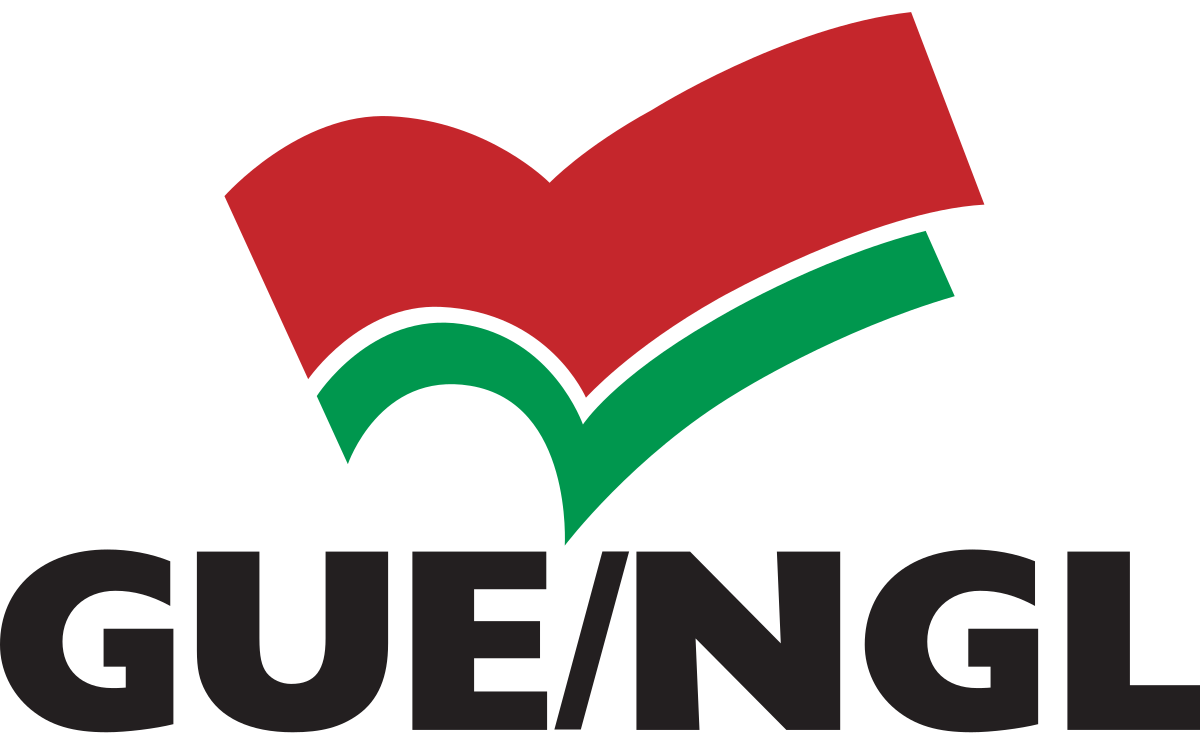
Die Konföderale Fraktion der Vereinten Europäischen Linken/Nordischen Grünen Linken (englisch Confederal Group of the European United Left/Nordic Green Left, französisch Groupe Confédéral de la Gauche Unitaire Européenne/Gauche Verte Nordique), kurz GUE/NGL, ist eine seit 1994 bestehende Fraktion im Europäischen Parlament. Ihr gehören 51 Abgeordnete verschiedener linker, sozialistischer und kommunistischer Parteien an, sie ist damit die sechstgrößte Fraktion. Vorsitzende der Fraktion ist seit 2012 die Deutsche Gabriele Zimmer (Die Linke).
Aus Deutschland gehören der GUE/NGL die Europaparlamentarier der Partei Die Linke und ein inzwischen aus der Tierschutzpartei ausgetretener Abgeordneter an.
Einige der Parteien der GUE/NGL-Fraktion haben sich am 8. Mai 2004 zur Partei der Europäischen Linken (EL) zusammengeschlossen. Am 31. Januar und 1. Februar 2005 gründete sich zudem die Nordisch grün-linke Allianz (NGLA), deren Mitgliedsparteien teilweise ebenfalls der GUE/NGL-Fraktion angehören. Daneben gehören der Fraktion Mitglieder der EU-skeptischen Europeans United for Democracy (EUD), der regionalistischen Europäische Freie Allianz sowie des Tierschutz-Wahlbündnisses Euro Animal 7 an. Ein größerer Teil der Parteien der Mitglieder gehören jedoch keiner Europäischen Partei an.
The European United Left/Nordic Green Left (French: Gauche unitaire européenne/Gauche verte nordique, GUE/NGL) is a left-wing political group in the European Parliament established in 1995.[9]
The group comprises political parties of socialist and communist orientation.[10][11]
Le groupe confédéral de la Gauche unitaire européenne/Gauche verte nordique (GUE/NGL) est un groupe politique du Parlement européen qui regroupe des partis de gauche, de tendance socialiste, antilibérale, anticapitaliste, écosocialiste ou communiste. Il regroupe essentiellement des organisations membres du Parti de la gauche européenne (PGE), mais aussi de l'Alliance de la Gauche verte nordique, de la Gauche anticapitaliste européenne ou sans affiliation. Il regroupe des partis allant de la gauche radicale à l'extrême gauche2.
Ce groupe de 52 députés européens, présidé depuis 2012 par Gabriele Zimmer3, est la sixième force politique du Parlement européen en nombre de sièges.
Sinistra Unitaria Europea/Sinistra Verde Nordica (in inglese: Confederal Group of the European United Left/Nordic Green Left, EUL/NGL; in francese: Groupe Gauche Unitaire Européenne/Gauche Verte Nordique, GUE/NGL) è un gruppo politico del Parlamento europeo costituito su iniziativa di due distinte organizzazioni politiche:
- il Partito della Sinistra Europea, socialista e comunista;
- l'Alleanza della Sinistra Verde Nordica, ecosocialisti del Nord Europa.
Европейские объединённые левые/Лево-зелёные Севера (GUE/NGL) — левая политическая группа в Европарламенте, представители которой принадлежат к различным коммунистическим, левосоциалистическим, троцкистским, экологическим и зоозащитным партиям Европы. На 2018 год численность группы в Европарламенте составляет 52 депутата.[1]
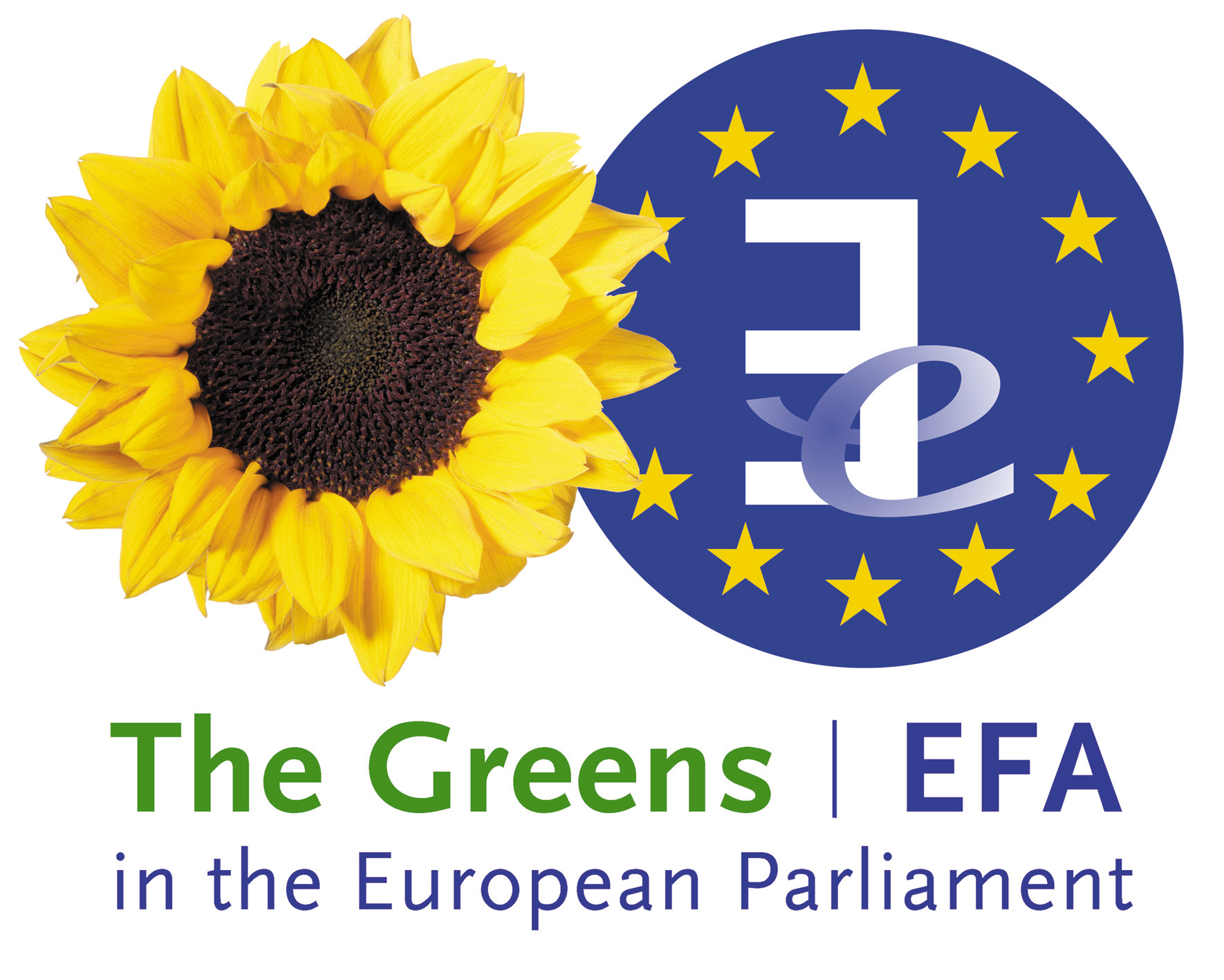
Die Fraktion Die Grünen/Europäische Freie Allianz im Europäischen Parlament (Grüne/EFA)[1] ist eine Fraktion im Europäischen Parlament. Sie wird im Wesentlichen von zwei Europaparteien getragen, der Europäischen Grünen Partei (EGP) und der regionalistischen Europäischen Freien Allianz (EFA). Kurz vor der Europawahl 2019 hatte die Fraktion 52 Mitglieder. Davon waren 41 Mitglied der EGP, sieben Mitglied der EFA und vier waren unabhängige Mitglieder der Fraktion.
Vorgänger der Fraktion war die nach der Europawahl 1984 gegründete Regenbogenfraktion, der neben Grünen und Regionalisten auch linke Parteien angehörten. Nach der Europawahl 1989 spaltete sich davon die Fraktion Die Grünen im Europäischen Parlament ab. Nachdem die EFA aus den Europawahlen 1994 deutlich geschwächt hervorging, vereinigte sie sich mit einigen radikalliberalen Parteien zur Fraktion der Europäischen Radikalen Allianz. Nach der Europawahl 1999 zerfiel auch diese Fraktion und die EFA-Mitglieder schlossen sich der Grünen Fraktion an, die ihren Namen in Die Grünen/Europäische Freie Allianz änderte.[1]
Die Fraktion Grüne/EFA war in der Legislaturperiode 2004–2009 die Fraktion mit der höchsten Fraktionsdisziplin, d. h. den kleinsten Unterschieden im Abstimmungsverhalten.[2] Zugleich war sie die Fraktion, deren Mitglieder am häufigsten bei Plenarsitzungen des Parlaments anwesend waren.[3]
Aus dem deutschsprachigen Raum waren in der Legislaturperiode 2014–2019 aus Deutschland Bündnis 90/Die Grünen mit 11 Abgeordneten sowie je ein Abgeordneter der Piratenpartei Deutschland und der Ökologisch-Demokratischen Partei, aus Österreich Die Grünen – Die Grüne Alternative mit drei Abgeordneten und aus Luxemburg Déi Gréng mit einem Abgeordneten vertreten.
绿党–欧洲自由联盟(英语:Greens–European Free Alliance,缩写为Greens – EFA;法语:Le Groupe Verts – Alliance libre européenne,缩写为Les Verts – ALE;德语:Fraktion der Grünen – Europäische Freie Allianz,缩写为Grüne/EFA)是欧洲议会中的一个党团,[1] 由欧洲绿党和欧洲自由联盟两个欧洲政党所组成。[2]
在2004年2月以前,该党团的名称是欧洲绿党联盟(European Federation of Green Parties),缩写为EFGP-EFA。
欧州緑グループ・欧州自由同盟(おうしゅうみどりグループ・おうしゅうじゆうれんめい)は、欧州議会の政治会派[1]。
欧州緑グループ・欧州自由同盟は欧州緑の党と欧州自由同盟という2つの欧州規模の政党によって結成されている[2]。このうち欧州自由同盟は国家を持たない民族・地域政党で構成されており、これらはいずれも急進的な政党である[3]。欧州緑グループ・欧州自由同盟には先述の2つの欧州規模の政党以外に、2004年から2009年まではオランダの透明なヨーロッパが、2009年以降はスウェーデンの海賊党が参加している。
The Greens/European Free Alliance (Greens/EFA) is the political group in the European Parliament containing green and regionalist political parties.[4][5][6]
Formed following the 1999 European elections for the 5th European Parliament, the Greens/EFA group now consists of three distinct European political parties, namely the larger European Green Party (EGP) and the European Free Alliance (EFA)[7] and the smaller European Pirate Party. The EFA consists of parties representing stateless nations, regionalist and minority political interests. The group has generally limited its membership to progressive parties.[8] These European parties are joined by MEPs from non-aligned national parties, which have included the Dutch Europe Transparent (2004–2009) and the Swedish (2009–2014) and German (2014–) Pirate Parties.[9]
Le Groupe des Verts/Alliance libre européenne est l'un des huit groupes du Parlement européen. Le groupe réunit deux partis politiques européens différents : le Parti vert européen et l'Alliance libre européenne, qui siégeaient auparavant dans deux groupes distincts, respectivement le Groupe des Verts et l'Alliance radicale européenne. Il dispose de 52 sièges à la suite des élections européennes de 20141.
Il Gruppo Parlamentare dei Verdi - Alleanza Libera Europea al Parlamento europeo (Verdi/ALE) (in inglese: The Greens – European Free Alliance, G/EFA; in francese: Les Verts – Alliance Libre Européenne, Verts/ALE) è un gruppo politico del Parlamento europeo ambientalista e regionalista nato nel 1999. Aderiscono a questo gruppo la Federazione Europea dei Partiti Verdi, poi diventata Partito Verde Europeo, e l'Alleanza Libera Europea.
El Grupo de Los Verdes / Alianza Libre Europea (abreviado como Greens-EFA por su nombre en inglés) es un grupo político del Parlamento Europeo compuesto por los eurodiputados del Partido Verde Europeo (EGP) y Alianza Libre Europea (EFA), así como un conjunto de diputados independientes o de partidos sin partido político europeo, entre los que destacan los miembros del Partido Pirata Europeo (PIRATES).
Son el quinto grupo en fuerza del Parlamento Europeo, con 52 diputados frente a los 55 que tenían al finalizar la séptima legislatura. Los co-presidentes del grupo son el belga Philippe Lamberts de Ecolo, que sustituye al alemán Daniel Cohn-Bendit, y la alemana Ska Keller de la Alianza 90/Los Verdes.
Зелёные — Европейский свободный альянс (англ. The Greens–European Free Alliance, сокр. англ. Greens – EFA; фр. Les Verts – Alliance libre européenne; нем. Die Grünen – Freie Europäische Allianz) — одна из фракций Европейского парламента. На 2015 год насчитывает 50 депутатов[1].
Фракция состоит из двух европейских партий: Европейской партии зелёных и Европейского свободного альянса (ЕСА). Последняя представляет интересы национальных меньшинств. Кроме того, в неё входят и представители отдельных партий, не входящих в европейские партии.
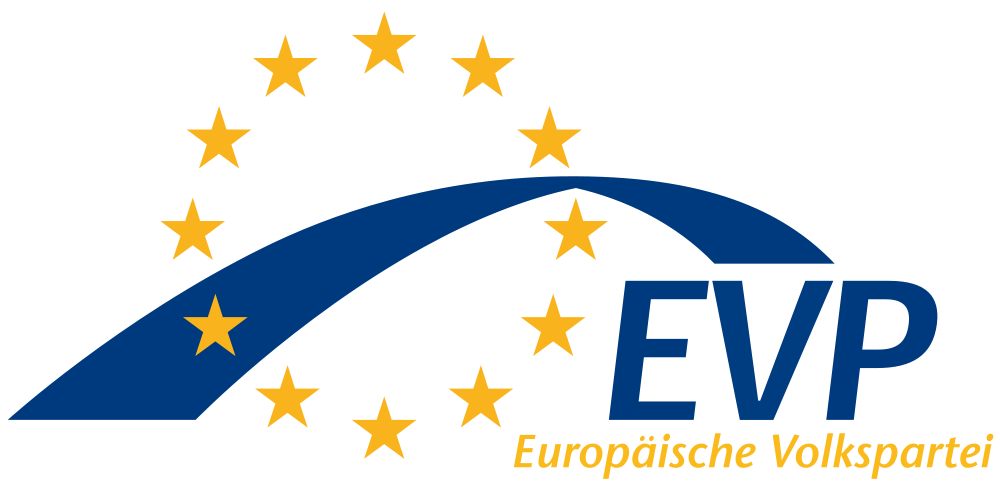
Die Europäische Volkspartei (EVP; französisch Parti populaire européen, PPE, englisch European People’s Party, EPP) ist eine europäische politische Partei, die sich aus christlich-demokratischen und bürgerlich-konservativen bis hin zu nationalkonservativ-rechtspopulistischen Mitgliedsparteien in der Europäischen Union zusammensetzt. Daneben gehören Parteien aus nicht-EU-Ländern der EVP als assoziierte oder beobachtende Mitglieder an. Aus dem deutschen Sprachbereich sind die CDU und die CSU aus Deutschland, die ÖVP aus Österreich, die CSV aus Luxemburg sowie die CSP aus Belgien Mitglieder der EVP; die Schweizer CVP ist assoziiertes Mitglied und die Südtiroler Volkspartei hat Beobachterstatus.
Die EVP wurde 1976 von hauptsächlich christlich-demokratischen Parteien gegründet. Sie hat die Form einer internationalen Vereinigung ohne Gewinnerzielungsabsicht belgischen Rechts. Die EVP ist eine von drei europäischen Regionalabteilungen der Internationalen Demokratischen Union (IDU).
Im Europäischen Parlament stellt die EVP mit der Fraktion der Europäischen Volkspartei (Christdemokraten) die seit 1999 größte Fraktion. Derzeit gehören 216 Abgeordnete der EVP-Fraktion an, darunter auch einige, die nicht der EVP angehören (Stand: 30. Mai 2019[1]). Daneben bestehen auch EVP-Fraktionen im Ausschuss der Regionen der EU sowie in den parlamentarischen Versammlungen in anderen transnationalen Organisationen wie dem Europarat, der OSZE oder der NATO. In der Legislaturperiode 2014–2019 stellt die EVP 14 Mitglieder der Europäischen Kommission (einschließlich des Kommissionspräsidenten) und den Präsidenten des Europäischen Rates.
欧洲人民党(英语:European People's Party,缩写为EPP)成立于1976年,是欧盟最大的跨国中间偏右政党。欧洲人民党结合了欧洲的中间偏右基督教民主党与保守党。目前欧洲人民党是欧洲议会的第一大党。
欧州人民党(おうしゅうじんみんとう、EPP)は、1976年創設の欧州規模の政党。欧州議会では欧州人民党に参加する各国内政党のほか、中道右派やキリスト教民主主義系の無所属議員で会派「欧州人民党グループ」を形成している。欧州人民党には、欧州諸国中40か国の保守主義政党およびキリスト教民主主義政党のうち、74の政党が加盟している。
現在の党議長は、ベルギー元首相のウィルフリート・マルテンス。2006年のローマ大会で再選された。任期は3年。ローマ大会では、副議長として、ミシェル・バルニエ(フランス、国民運動連合)、ユルキ・カタイネン(フィンランド、国民連合党)、ロイゼ・ペテルレ(スロベニア、スロベニア人民党)、オルバン・ヴィクトル(ヴィクトル・オルバン、ハンガリー、フィデス=ハンガリー市民同盟)、ペーター・ヒンツェ(ドイツ、キリスト教社会同盟)、Enda Kenny(アイルランド、フィネ・ゲール)、ヤツェク・サリウシュ=ヴォルスキ(ポーランド、市民プラットフォーム)が選出された。
The European People's Party (EPP) is a European political party with conservative[6] and liberal-conservative[2] member parties. A transnational organisation, it is composed of other political parties, not individuals. Founded by primarily Christian democratic parties in 1976, it has since broadened its membership to include liberal-conservative parties and parties with other centre-right political perspectives.[7][8][9][10]
The EPP has been the largest party in the European Parliament since 1999 and in the European Council since 2002. It is also by far the largest party in the current European Commission. The President of the European Council, President of the European Commission and the President of the European Parliament are all from the EPP. Many of the Founding fathers of the European Union were also from parties that later formed the EPP. Outside the EU the party also controls a majority in the Parliamentary Assembly of the Council of Europe. The EPP has alternated with its centre-left rival the Party of European Socialists (PES) as the largest European political party and parliamentary group.
The EPP includes major centre-right parties such as the CDU/CSU of Germany, The Republicans of France, CD&V of Belgium, KDU-ČSL of the Czech Republic, Fine Gael of Ireland, New Democracy of Greece, Forza Italia of Italy, the People's Party (PP) of Spain, the Social Democratic Party of Portugal, the Civic Platform of Poland but also Fidesz of Hungary.
Le Parti populaire européen (PPE/EPP) est un parti politique européen, regroupant à l'échelle du continent un ensemble de partis de droite et de centre droit d'inspiration démocrate chrétienne et libérale-conservatrice, disposant d'un groupe au Parlement européen et à l'Assemblée parlementaire du Conseil de l'Europe.
Fondé en 1976, le PPE compte plus de 70 partis membres de 40 pays différents, de nombreux chefs d'État et de gouvernement provenant de pays membres de l'Union européenne, treize membres de la Commission européenne, dont le président du Conseil européen, ainsi que le groupe le plus important au sein du Parlement européen. Le PPE se décrit comme « une famille se situant au centre droit de l'échiquier politique, dont les racines puisent dans l'histoire et la civilisation du continent européen et qui a, dès l'origine, œuvré pour le projet européen ».
Il Partito Popolare Europeo (acronimo PPE) è un partito politico europeo. È la famiglia politica europeista di centro e di centro-destra che raccoglie le forze generalmente classificabili come moderate, cristiano-democratiche e conservatrici.
Oltre ad essere il maggiore partito rappresentato in ciascuna delle istituzioni dell'Unione europea ed anche il più ampio del Consiglio d'Europa, è il più influente dei partiti europei ed è il più grande gruppo politico nel Parlamento europeo con 216 eurodeputati. Attualmente tutte e tre le cariche rappresentative dell'Unione Europea (il presidente del Consiglio europeo, il Presidente della Commissione europea ed il presidente del Parlamento Europeo) sono rappresentate da esponenti del PPE.
Fondato nel 1976 da partiti cristiano-democratici, ispiratisi all'azione degli statisti europeisti De Gasperi, Adenauer e Schumann nel secondo dopoguerra, successivamente ha visto l'adesione anche di soggetti appartenenti all'area di centro-destra. Tuttavia i partiti membri hanno collocazioni politiche diverse nei singoli Paesi (nella maggior parte dei casi alternative alla sinistra, ma in altri casi alleati di governo con partiti di centrosinistra, in altri ancora distinti sia dalla sinistra che dalla destra).
Il PPE raggruppa 73 partiti membri provenienti da 39 Paesi, di cui 27 sono membri dell'UE. Fra questi ritroviamo vari partiti importanti come IR in Francia, la CDU in Germania, FI in Italia, PO in Polonia ed il PP in Spagna.
È il primo partito nel Parlamento europeo dal 1999, nel Consiglio europeo dal 2002 e nell'attuale Commissione europea. Alcuni dei padri fondatori dell'Unione europea appartenevano a partiti che sono successivamente entrati a far parte del PPE.
El Partido Popular Europeo (en inglés European People's Party, abreviado EPP) es un partido político europeo de centroderecha y proeuropeo. Fue fundado en 1976 por partidos demócrata-cristianos, pero posteriormente ha ampliado su composición para incluir a conservadores y otras perspectivas de centroderecha.13
El PPE es el principal partido de la Unión Europea (UE), con más de 200 diputados en el Parlamento Europeo, todos ellos presentes en el Grupo del Partido Popular Europeo. Además cuenta con 14 miembros de la Comisión Europea, incluido el presidente Jean-Claude Juncker, y 7 en el Consejo Europeo, además de su presidente.456
Con 75 partidos repartidos en 40 países de Europa, controla 10 estados de todo el continente y cuenta con el mayor grupo de la Asamblea Parlamentaria del Consejo de Europa, con más de 190 miembros en el Grupo del Partido Popular Europeo.78
El PPE incluye partidos tan importantes como la Unión Demócrata Cristiana de Alemania, Los Republicanos de Francia o el Partido Popular de España, y cuenta con miembros en todos los estados miembros de la Unión Europea salvo el Reino Unido.2
Европе́йская наро́дная па́ртия (ЕНП) — правоцентристская общеевропейская политическая партия, основанная в 1976 году. Включает в себя христианско-демократические и консервативные партии стран Европы.
ЕНП — одна из крупнейших партий Европы, представленная во всех политических институтах Европейского союза, а также в Совете Европы. Партия включает в себя 73 коллективных члена, национальные партии из 39 стран.
Согласно их странице в Интернете ЕНП это «объединение политического центра, чьи корни лежат в глубинах истории европейской цивилизации. Она объединяет национальные партии с близкой идеологией в государствах-членах и ассоциированных членах ЕС, а также поддерживает близкие контакты со странами — возможными кандидатами».
ЕНП включает в себя 16 глав правительств стран — членов Европейского союза и 6 глав правительств стран, не входящих в ЕС, также 13 членов Европейской комиссии (в том числе председателя Комиссии), председателя Европейского совета, председателя Европейского парламента и крупнейшую фракцию в Европейском парламенте, которая состоит из 265 членов. С 2013 года президентом EPP является депутат Европарламента Жозеф Доль.
Европейская народная партия имеет молодёжное отделение, Молодёжь Европейской народной партии (англ. YEPP). Европейские студенты-демократы (англ. EDS) — группа студенческих политических партий, ассоциированная с ЕНП.
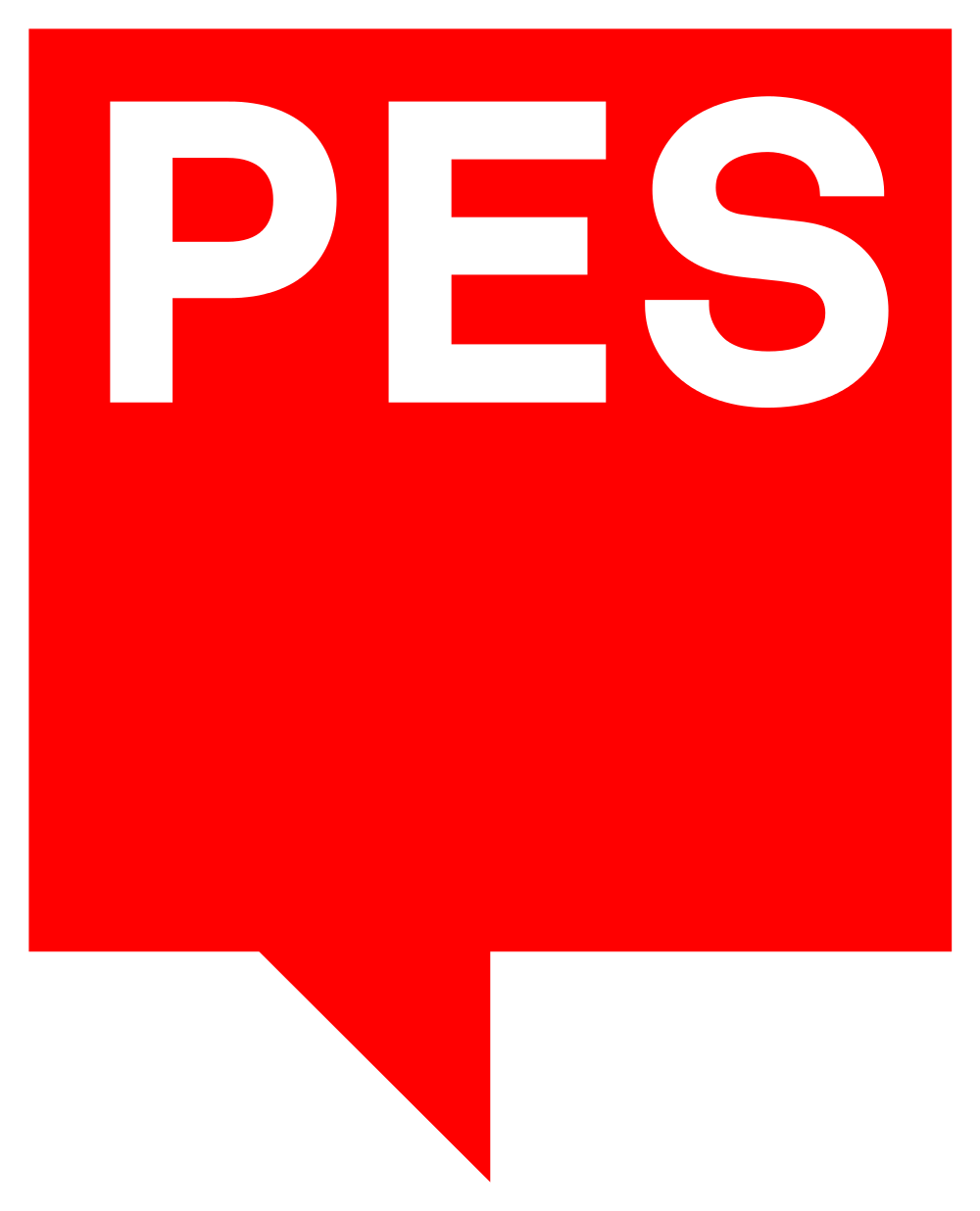
欧洲社会党(英语:Party of European Socialists,缩写为PES)是一个欧洲政党,其成员是欧盟及周边国家的社会民主主义政党。它是欧洲议会内的一个政党团体,于1992年成立,接替欧洲共同体时代的社会党邦联。目前欧洲社会党主席是来自丹麦社会民主党的波尔·尼鲁普·拉斯穆森(Poul Nyrup Rasmussen)。PES的成员分布在绝大多数欧洲机构内,包括欧洲议会、欧洲委员会、欧盟理事会、欧洲理事会和欧盟地区委员会。
欧洲社会党目前拥有来自25个欧盟国家和挪威的32个正式成员,外加8个准成员党(多数来自未来即将加入欧盟的中东欧国家),和5个观察员员。欧洲社会党宣称他们有4大任务:
- 加强欧盟内部和整个欧洲的社会主义和社会民主运动;
- 发展各国成员政党、成员政党议会党团、欧洲社会党党团和欧洲社会党本身的紧密合作关系;
- 制定欧盟的共同政策;
- 在欧洲议会选举中采取统一步调;
欧州社会党(おうしゅうしゃかいとう)は、社会民主主義政党で構成される欧州規模の政党。
欧州議会の政治会派としては社会民主進歩同盟の大部分を形成し、欧州人民党グループに次ぐ第2会派となっている。国際組織は社会主義インターナショナルに加盟。党首はブルガリア前首相のセルゲイ・スタニシェフ。
The Party of European Socialists (PES) is a social-democratic European political party.[5]
The PES comprises national-level political parties from all member states of the European Union (EU) plus Norway. This includes major parties such as the Italian Democratic Party, the British Labour Party, the French Socialist Party, Social Democratic Party of Germany and the Spanish Socialist Workers' Party. Parties from a number of other European countries are also admitted to the PES as associate or observer parties.[6] Most member, associate and observer parties are members of the wider Progressive Alliance or Socialist International.[3][4]
The PES is currently led by its president Sergei Stanishev, a former Prime Minister of Bulgaria. Its political group in the European Parliament is the Progressive Alliance of Socialists and Democrats (S&D). The PES also operates in the Committee of the Regions (in the PES Group in the Committee of the Regions) and the European Council.
Le Parti socialiste européen (PSE) est un parti politique européen regroupant les partis socialistes, sociaux-démocrates et travaillistes d'Europe. Son groupe politique est le deuxième en taille au Parlement européen après les élections de 2014 (191 députés en juin 2016). Il se partage le pouvoir au Parlement européen avec le Parti populaire européen (PPE) comme l'illustre le partage de la présidence du Parlement européen. Selon la tradition européenne, il peut participer à des majorités de circonstance avec le Parti vert européen et le Parti de la gauche européenne, comme avec le PPE et le Parti de l'Alliance des libéraux et des démocrates pour l'Europe. Le PSE est lié à l'Internationale socialiste.
Il Partito del Socialismo Europeo (PSE o PES[1]), meglio noto come Partito Socialista Europeo, è un partito politico europeo di orientamento socialista, socialdemocratico e laburista fondato nel 1992. Precursore del partito è stata la Confederazione dei Partiti Socialisti della Comunità Europea, fondata nel 1973.[2]
In sede di Parlamento europeo, il PSE ha dato vita nel 2009 all'Alleanza Progressista dei Socialisti e dei Democratici; prima di allora, aderiva al gruppo del Partito del Socialismo Europeo (la cui denominazione ufficiale è tuttavia variata nel corso del tempo).[3]
Da settembre 2012 il presidente è l'ex primo ministro bulgaro Sergej Stanišev.[4]
El Partido Socialista Europeo (en inglés Party of European Socialists, abreviado PES) es un partido político europeo de centroizquierda y proeuropeo. Fue fundado en 1992 por los partidos que formaban la Confederación de los Partidos Socialistas de la Comunidad Europea, creada en 1973.1
El PSE es el segundo partido de la Unión Europea (UE) con 178 diputados en el Parlamento Europeo, la gran mayoría presentes en el Grupo de la Alianza Progresista de Socialistas y Demócratas. Además cuenta con 8 miembros de la Comisión Europea, incluidos el vicepresidente primero Frans Timmermans y la alto representante para Asuntos Exteriores y Política de Seguridad Federica Mogherini, y otros 8 en el Consejo Europeo.23
Con 58 partidos repartidos en casi 50 países de Europa y el Mediterráneo, el Partido de los Socialistas Europeos controla 12 estados de la zona de manera directa y participa en otros 8 gobiernos en coalición, y cuanta con el segundo grupo de la Asamblea Parlamentaria del Consejo de Europa, con más de 120 miembros en el Grupo Socialista.45
El PSE incluye partidos tan importantes como el Partido Socialista de Francia, el Partido Socialista Obrero Español de España, el Partido Socialista de Portugal o los Socialdemócratas de Dinamarca, y cuenta con miembros en todos los estados de la Unión Europea.4
Партия европейских социалистов (ПЕС) (англ. Party of European Socialists (PES)) — европейская партия, состоящая из 33 социалистических, социал-демократических и рабочих партий из государств-членов Евросоюза и Норвегии.
Лидером партии является Сергей Станишев. В Европарламенте формирует Прогрессивный альянс социалистов и демократов.
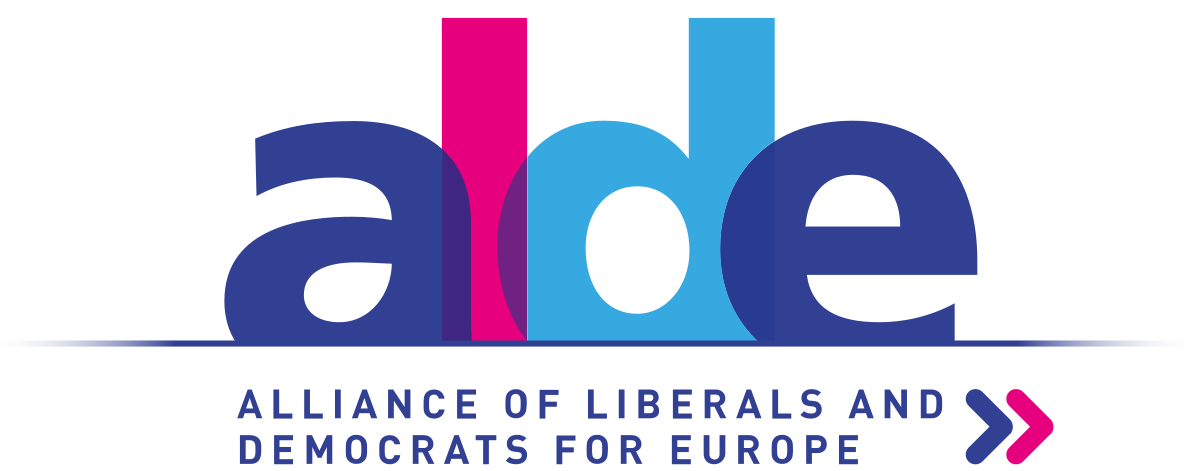
Die Fraktion der Allianz der Liberalen und Demokraten für Europa (ALDE) war von 2004 bis 2019 eine Fraktion im Europäischen Parlament. Auch in der Parlamentarischen Versammlung des Europarats, im Ausschuss der Regionen sowie in der Parlamentarischen Versammlung der NATO bestehen Fraktionen dieses Namens.
Die ALDE-Fraktion im Europäischen Parlament bestand aus den Abgeordneten der liberalen ALDE-Partei, ehemals Europäische liberale demokratische und Reformpartei (ELDR), der liberale Parteien angehören, und der Europäischen Demokratischen Partei (EDP), einer Vereinigung von Zentrumsparteien. Von 2004 bis 2014 war sie drittgrößte Fraktion, von 2014 bis 2019 viertstärkste Gruppe des Parlaments. Zuletzt umfasste die ALDE-Fraktion 67 Mitglieder aus 21 Ländern. Vorsitzender der ALDE-Fraktion war bis 2009 Graham Watson, danach Guy Verhofstadt.
Auch in der Parlamentarischen Versammlung des Europarats gibt es eine ALDE-Fraktion. Dort sind mangels einer eigenen grünen Fraktion auch vereinzelte Mitglieder der Europäischen Grünen Partei (EGP) Teil der ALDE.
Unterlagen der europäischen Liberalen (ALDE, ELDR) werden im Archiv des Liberalismus der Friedrich-Naumann-Stiftung für die Freiheit in Gummersbach aufbewahrt.
欧州自由民主同盟(おうしゅうじゆうみんしゅどうめい)は、欧州規模の政党である欧州自由民主改革党と欧州民主党の連合体。欧州議会の院内会派を結成しているほか、欧州連合の地域委員会、欧州評議会議員会議、北大西洋条約機構 (NATO) 議員会議内でも政治グループを作り活動している。これらのグループは独立系に分類される。
国際組織は、欧州自由民主改革党が自由主義インターナショナルに加盟している。
The Alliance of Liberals and Democrats for Europe group (ALDE) is the liberal–centrist[5][6] political group of the European Parliament. It is made up of MEPs from two European political parties, the Alliance of Liberals and Democrats for Europe Party and the European Democratic Party, which collectively form the Alliance of Liberals and Democrats for Europe.
The ALDE Group is one of the three oldest Groups, dating its unofficial origin back to September 1952 and the first meeting of the Parliament's predecessor, the Common Assembly of the European Coal and Steel Community. Founded as an explicitly liberal group, it has expanded its remit to cover the different traditions of each new Member State as they acceded to the Union, progressively changing its name in the process.
The ALDE Group is the fourth-largest group in the current Eighth European Parliament term, and previously participated in the Grand Coalition (the coalition designed to provide a majority) for the Sixth Parliament (2004–2009). The pro-European platform of ALDE supports free market economics and pushes for European integration and the European single market.[7]
L'Alliance des démocrates et des libéraux pour l’Europe (ADLE)1 est un groupe politique du Parlement européen qui rassemble depuis juillet 2004 deux partis politiques européens : le Parti de l'Alliance des libéraux et des démocrates pour l'Europe (ALDE, auparavant Parti européen des libéraux, démocrates et réformateurs, ELDR) et le Parti démocrate européen (PDE). Comptant 69 députés issus de 22 États membres de l’Union européenne, c’est le quatrième groupe politique le plus important au sein du Parlement européen. Son président, depuis le 30 juin 2009 est le Belge Guy Verhofstadt2. L’ADLE est également représentée dans le Comité européen des régions, l’Assemblée parlementaire du Conseil de l'Europe et l’Assemblée parlementaire de l’OTAN.
|testata = |iscritti = |sito = |organizzazione giovanile = |categorie = gruppi }}
Il Gruppo dell'Alleanza dei Democratici e dei Liberali e per l'Europa (in inglese: Alliance of Liberals and Democrats for Europe - ALDE; in francese: Alliance des Démocrates et des Libéraux pour l'Europe - ADLE) è un gruppo politico del Parlamento europeo. Si compone di due partiti europei:
- Partito dell'Alleanza dei Liberali e dei Democratici per l'Europa (ALDE);
- Partito Democratico Europeo (PDE).
È il quarto gruppo per numero di parlamentari. Lo presiede il belga Guy Verhofstadt, eletto alla carica il 30 giugno 2009.
El Grupo de la Alianza de los Liberales y Demócratas por Europa (abreviado como ALDE por su nombre en inglés) es un grupo político del Parlamento Europeo compuesto por casi todos los diputados del Partido de la Alianza de los Liberales y Demócratas por Europa y del Partido Demócrata Europeo, así como de algunos partidos no adscritos.
Es el cuarto grupo en número de escaños en la octava legislatura del Parlamento Europeo (2014-2019) y es considerado la referencia liberal en las instituciones europeas, teniendo grupo en el Consejo de Europa (llamado ALDE-PACE), en el Comité de las Regiones de la Unión Europea y en la Asamblea Parlamentaria de la OTAN.
Desde julio de 2009, el presidente del Grupo de la Alianza de los Liberales y Demócratas por Europa es el belga Guy Verhofstadt, de los Liberales y Demócratas Flamencos, sucediendo al inglés Graham Watson del Liberal Demócratas.1 El grupo liberales europeos integraba hasta el 26 de septiembre de 2018 al recién creado PDeCAT (demócratas de Cataluña), sucesor de Convergencia I Unió, fecha en la que fue expulsado por unanimidad.

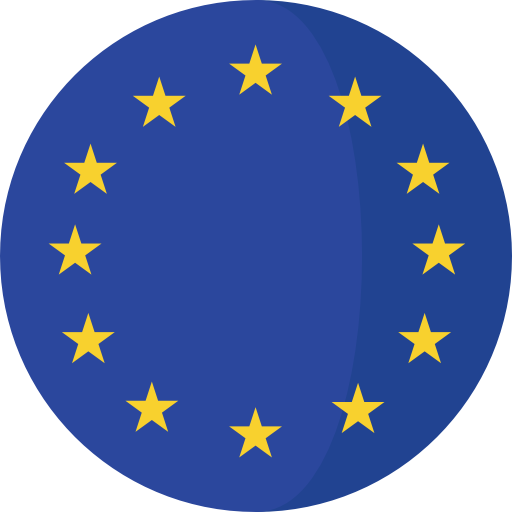 欧洲联盟
欧洲联盟

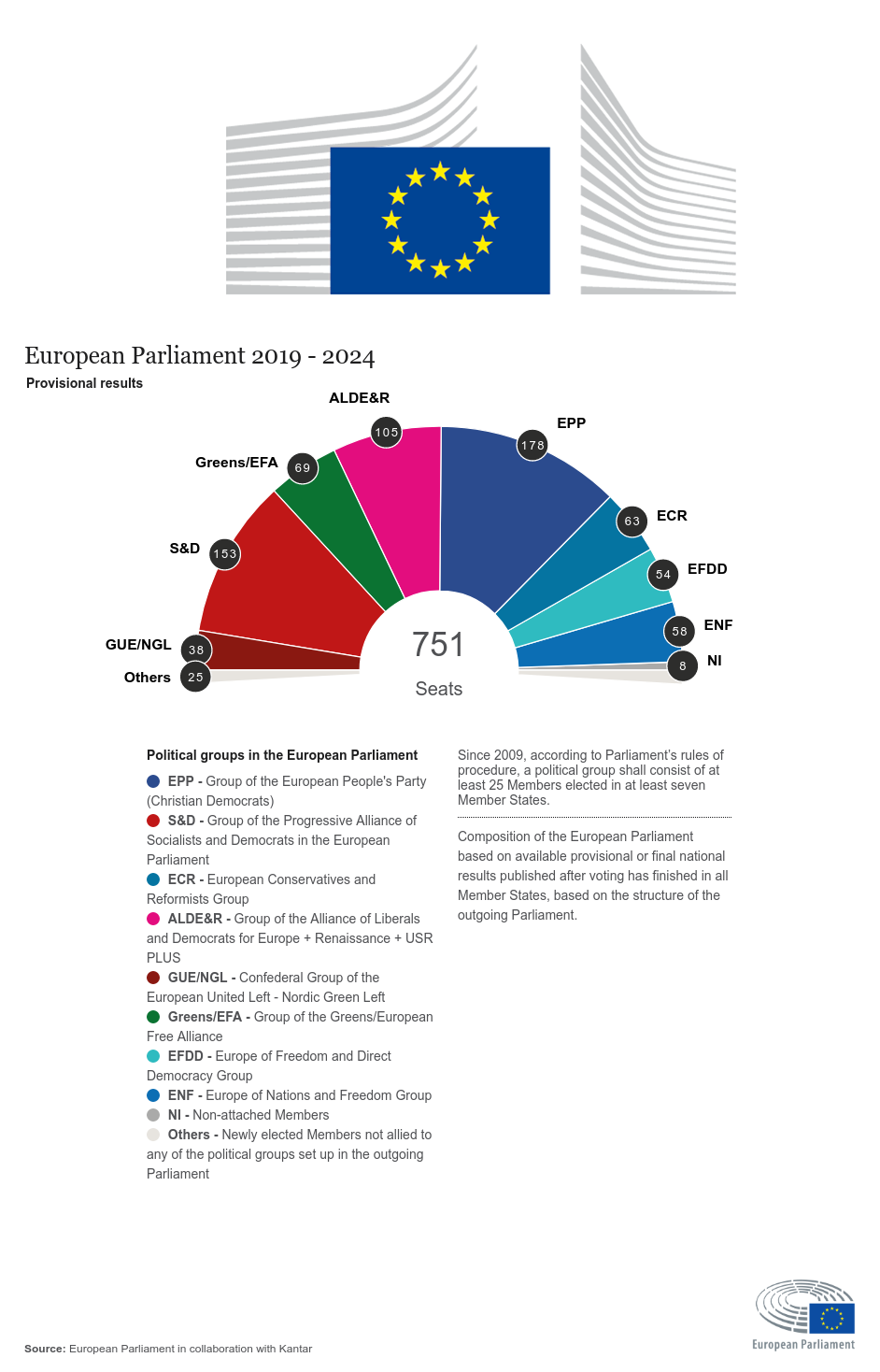
 政党和政府组织
政党和政府组织

